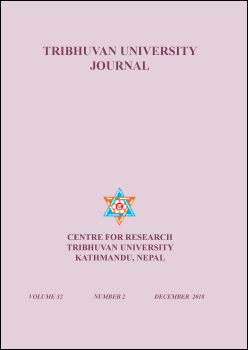Echoes of the Vision of Hindu Philosophy in T. S. Eliot’s Writings
DOI:
https://doi.org/10.3126/tuj.v32i2.24703Keywords:
Upanishad, karma, knowledge, bondage, wheel, liberation, Essence, the still point, non-dualAbstract
This paper makes an attempt to explore the echoes of the vision of Hindu philosophy in the selected works of T. S. Eliot. The works of Eliot such as his primary essay “Tradition and the Individual Talent,” and his primary poems such as “The Love Song of J. Alfred Prufrock,” “Gerontion,” The Waste Land, “Ash Wednesday,” “A Song for Simeon” and Four Quartets are under scrutiny in this paper. Eliot’s primary texts echo the vision of the Upanishads, the Bhagavad-Gita and the Patanjali Yoga Sutras of the Hindu (Vedic) philosophy. The vision is that rebirth is conditioned by one’s karma (actions). No one can escape from the fruits of his karma. One needs to undergo the self-realization to know the Essence (Brahman). When one knows the Essence, he is liberated from the wheel of life and death. Man himself is Brahman. The soul is immortal. The basic essence of Hindu philosophy is non-dual, which says that all the living beings and non-living objects are the manifestations of the same Ultimate Reality (Brahman). Eliot suggests that the knowledge of this essence can help humanity to promote equality and justice by ignoring discrimination and duality, to end human sorrows and to achieve real peace and happiness. This finding can assist humanity in the quest for understanding the meaning of human existence and the true spiritual nature of life to address the human sorrows resulted from the gross materialistic thinking.
Downloads
Downloads
Published
How to Cite
Issue
Section
License
This license enables reusers to distribute, remix, adapt, and build upon the material in any medium or format for noncommercial purposes only, and only so long as attribution is given to the creator.
© Center for Research, Tribhuvan University

